- Home
- Alice Walker
Now Is the Time to Open Your Heart Page 4
Now Is the Time to Open Your Heart Read online
Page 4
One night around the campfire the women were talking about getting older, what they thought about it.
I can’t bear it, said Margery, bluntly. I don’t care if it’s the last bottle of hair dye in the world and a dragon is guarding it, I’m going to get it.
I used to feel that way, said Cheryl.
I never did, said Sue.
You’re kidding? they both said, looking at her. She was a small woman with green, thoughtful eyes. It was Sue who knew the names of plants and what their medicinal purposes might be. Sue who had said the yellow flower Kate had chewed was called desert thistleweed.
No, she said now, poking a stick into the fire and shifting on her rolled-up sleeping bag. I couldn’t imagine it, even as a child. That women should do anything to their hair. I thought it was fabulous, no matter what color it was. I just couldn’t fathom what was wrong with it.
She laughed.
What was wrong with it, said Margery, was that it started turning white!
Gray, said Cheryl. Gray had such terrible associations, I used to think. It was the color of blandness, dullness. Lifelessness. But then I began to notice stones and water, and gray skies, not to complain about but to appreciate. If you’ve ever lived through a drought you appreciate gray skies. Rain. Rain is gray, she said.
Her hair was long and silvery white; she wore it in a ponytail while they were on the boat; now it hung free and the moonlight rested lovingly on it. The beauty of it there in the canyon, where every boulder, tree, and bush held its natural color, could not be denied.
Kate laughed, and the women turned to her.
I always tell people I am too absentminded to remember to color my hair, she said, but the truth is, I am too vain.
The women waited for more.
Oh, I tried it for a while. And actually got to be fairly good at it. I was never of the color every strand every single month school. I was more of the color it every couple of months, who cares about trying to do it perfectly.
They laughed, partly at Kate’s animation. She’d been too sick to join in their talks before.
But then, she continued, I began to experience a feeling I hadn’t felt since high school, when I first began straightening my hair. I began to feel humiliated. It felt like I was abusing myself. Hiding something important that was not really at fault. Besides, I started to feel I was missing what was going on with me. The incredible change; it had to mean something. What did it mean? I wondered.
She leaned back on her sleeping bag, and looked around at the women in her circle. There were five of them. Another circle of four sat and sprawled around a smaller fire a few yards away. It felt luxurious to be out camping with a band of mature women, and Kate reveled in the intimacy engendered by their distance from everything and everyone they knew.
I used to straighten my hair, in the sixties, said Lauren. She had short, bright red hair that curled around her ears. It was long then, very, and I straightened it with an electric iron. On an ironing board. I was quite the contortionist.
The women laughed to think of the fads of youth.
Kate remembered sitting in the beauty shop, which never, in those days, seemed clean and bright enough, and watching the women undergo the torture of having their hair straightened with hot combs. It had not occurred to her to question this behavior at the time: What could be so wrong with our natural hair? And then of course, at college there had been chemical “relaxers.” Painless, unless the cosmetologist poured on too much, or mixed it too strong. She’d dreaded going to the shop, and never understood how other young girls enjoyed it. They seemed to suffer willingly, or, more likely, now that she thought of it, they had probably ignored the process. Choosing to focus on the results. She remembered all of them sitting listlessly, oblivious to self-danger, heads in magazines, waiting their turn.
Sometimes now she colored her hair, just for fun. But she never did it in the spirit of covering up her age. Her recognition of such an entrenched vanity eventually amused her.
I’m glad of the tucks and sucks too, said Margery. I’ve had both. And.
Tell us, said Sue.
And so it continued until bedtime. One story leading to another, no woman’s story more important than another’s. Every woman’s choices honored as her own.
The tenth night on the river she dreamed of her mother. Her body mangled by the car crash. Her head however completely unmarked, her eyes and face clear. When Kate looked down at her hands, she saw one of them was missing. The other was busy untangling what looked like a fishing net. They were sitting beside the ocean, and her mother gazed out upon it as she spoke: It puzzled me that you did not understand, she said.
But how could I understand? Kate asked. I was never told anything.
The secret is, you do not have to be told, said her mother, finishing the net, and now holding it with two whole hands, preparing to fling it into the sea. We do not need a boat for this, she added, anticipating Kate’s question.
Kate woke up and lay in her sleeping bag watching the dawn. She could hear the oarswomen readying their boats. Soon it would be time to pack up her gear and stuff it in the waterproof duffel folded neatly beside a nearby tree.
Her mother’s face, patient and wise, came back to her, as it had appeared in the dream. How beautiful her mother had been! A sunny brown, with thick black hair, compassionate but shrewdly intelligent eyes that missed very little, and a readiness to make and laugh at jokes that had endeared her to everyone who knew her. Kate’s father had adored her since they were both six years old.
Her hand had grown back, she fished without a boat. Why did she even need the net? thought Kate.
All day in the little dorie Kate thought about the dream. For that one enigmatic moment with her mother, she would have made the river journey. Though she had brought nothing to write on, she knew she must begin a story about a mother and a daughter. Borrowing a tiny Post-it pad from Avoa, who loved dreams, both having them herself and hearing and interpreting those of other people, she began.
It was a sultry summer day, the day we buried my mother. The night before, at the wake, I stood over her body and tried to peer straight into her brain. She was shrunken from the cancer she’d battled the last years of her life; her mouth was twisted from the suffering she had endured. The flowers arrayed around her coffin smelled heavy and wet. I felt desperate for fresh air. Why were you so dissatisfied with me? I asked her.
In the kitchen my younger sister embraced me. We had not seen each other in nearly a decade. Unlike me, she was slender and dark. Her hair now streaked with silver. My older sister, her hair a russet that matched her dress, and her shoes, was busy making potato salad, her specialty. My father sat at the kitchen table nursing a cup of chamomile tea.
“Daddy, you must eat something.” It seemed to me Tonya was always saying something like this. She was a natural-born comforter. I couldn’t have imagined a wake without her in charge of it.
Now she stood over our father, as our mother might have; her arm around his shoulders. They looked very much alike. Firm-fleshed (even though Dad looked really old) and dark, with eyes that lit up their faces. They shared an easily aroused animation and love of good times.
He nodded at his cup.
“That’s nothing,” she said. “Tea. Have some chicken. Potato salad.”
“I can’t eat,” he said. He tilted his head in the direction of the living room.
“She would want you to,” said Tonya.
Harriet gave me an absentminded shove toward the food.
“You eat something too, Roberta.”
I was named for my father.
“Daddy,” I said, taking the hand that now clung to the teacup, “you and I are going to have some dinner.” He grunted.
“No refusals and no hesitation allowed.”
“Oh, well,” he said, looking up.
My father adored me. He thought I was just right. Though named for him, I didn’t look like him at all.
I took
two plates from the pile on the table, and moved toward the pots on the stove. I sensed rather than saw the dejection in the faces of both my sisters. I had always been able to wrap our father around my finger. He’d always listened to me.
“Um,” I said, forking up collard greens.
“I knew Roberta would get you to eat,” said Tonya, who’d cooked all the food.
Harriet said nothing. The hug between us now felt forgotten.
This was as much as Kate could write on the Post-its. She stuffed the story in her duffel along with her hiking boots and toiletries, and settled herself comfortably in the boat. Overhead there were vultures and crows, black and graceful against the terra cotta canyon walls. She daydreamed about the drift of her life; the lover in her house, in her bed. The recurring dream of the dry river. Her therapist’s skepticism that she knew what she was doing, going out to run a live river in her waking life.
She felt no stirring within. Though perhaps her mother’s visit had been one. It had been a very long time since she’d dreamed of her. After the crash, after identifying the bodies, she’d feared nightmares, but she’d been spared those. Her poor father’s body had been crushed like an accordion. She shuddered now to remember it. And yet, she felt she must remember it, linger over her response to it, there under the open protection of the sky, in the middle of charging waters, vulnerable to being dashed against rocks herself. She had longed to touch some whole part of him. And found that whole part in one of his feet. She’d grasped his toes, so long and hairy on their tops, and she’d caressed them until she felt satisfied. They never warmed from her hands, not the slightest bit. That was what being dead meant, she thought.
Now she realized that she was weeping, just a little, and that a pain in her shoulder, carried so long she’d gotten used to it, seemed to be shifting closer to the surface of her skin. She began to rotate her shoulders. Avoa, sitting next to her, began to rotate hers as well. Before long they were doing miniaturized yoga postures in the tiny boat.
Ahead of them the other women’s boat was entering unusually powerful rapids. As they watched, startled, it overturned. They had barely time to think before they were running the same rapids. She wondered if they too would be flung into the river. But no, their oarswoman steered them slightly more to the left of a huge boulder that rose up like an iceberg in the middle of the river. They sped past the others, all swimming madly toward the shore.
That night, as they sat around the campfire, she was flooded with gratitude. To see the women safe, to hear their humorous stories of their surprise, their fright. To know they had depended on their own strength and courage to pull themselves to shore.
That night, in the adrenaline glow of having survived, the talk was, of course, about sex.
How much and how often, right? said Margery, drying her hair with a towel and throwing a fistful of dried twigs on the fire.
How long and how much does size matter, anyway? said Cheryl, biting into a chocolate bar she’d stashed for just such an occasion.
The women laughed.
“Gimme something that’s not hard,/Come on, come on.”
Sue sang the refrain from John Lennon and Yoko Ono’s “Give Me Something,” from their Double Fantasy album. She loved Ono for recording what sounded like a live orgasm.
There’s a period in there where you really don’t want anything hard, said Kate.
Not me, said Cheryl. I fantasize big, hard, and long.
And black? asked Kate.
Cheryl colored. Sometimes, yes, she said. I’ll never forget the day I ambled into Good Vibrations and there it was, hanging on the wall.
The women roared.
There’s fantasy and then there’s, ah, actual flesh, said Annie, an oarswoman their own age, who had come over to join them. Firm is one thing; hard is something else, she said. She was a wiry Texan with a hawk’s nose and piercing gray eyes. Her wild white-streaked hair fanned out around her faded red baseball cap. The young can handle hard, she said; at our age firm is very acceptable. She lay back and looked thoughtfully into the fire. I once had a lover who preferred the term full. He thought being hard inside me would be painful, and it was.
Nature takes care of it very well, said Margery. If only someone would tell men it’s okay. Not to be hard as a rock, not to need to drive a woman through the bed.
Sally, wandering over from the other campfire, overheard this comment.
Well, she said, laughing with the women, I can see where the inquiring mind needs to be.
Oh, yes, said Cheryl, come sit with the big girls. We’ll tell you what time of night it is.
I can’t believe you’re all straight, said Sue.
There was a long pause.
I’ve been straight for incredibly long periods, said Margery. Thoughtfully.
The women hooted.
The moon overhead was creamy and round. The river was a wide yellow thread through the canyon. No longer on it, the women felt their kinship still. It was as if it now moved through their bodies, even while they slept.
She was drawn to Sue. She seemed so plain, so clear, so unadorned. They had separated from the others and were exploring caves, and their petroglyphs, high above the canyon floor.
I have always lived with women, said Sue, from the very beginning.
Didn’t you miss having a boyfriend? asked Kate.
Why would I miss what I never had? asked Sue, studying the triumphant figure of a woman giving birth. It was almost shocking, the power expressed in the woman’s attitude. The rock the artist had chosen was tall and round, like a person with its belly protruding. The woman giving birth was carved on the belly. Amazing, that artists were so alike, throughout eons. As giving birth was the same. But not the ecstatic sense of a woman’s power. That had changed, drastically. Now most women actually thought the doctor delivered the baby. Amazing.
Kate was silent, thinking of how she’d begun missing having a boyfriend long before having one. A boyfriend had seemed inevitable. The older girls at school talked about boys all the time, and had boyfriends. Her parents were there in front of her every single day; her mother cherishing, her father positively doting. It had seemed so natural. The only way to go. Her girl friends at school had certainly never appealed to her. They seemed too much like her, always worrying about how they looked, what to wear, how their hair was doing. She liked to go shopping with them, liked to eat and study with them. The thought of kissing one of them had never crossed her mind. In fact, even now, the thought of kissing one of them made her queasy.
Boys never interested me, said Sue. I always got along well with them, but nary a romantic thought had I. Now, though, I’m celibate.
Really, said Kate. Her hand rested near a carving of a large sunburst. A tiny figure that looked like a goat raised its head as if enjoying the radiance. She had never expected to find signs of human life in the canyons that radiated out from the main one. At a place far from the river that was reached after a long climb that began behind a waterfall they’d come to the place the Hopi claimed as the spot they’d emerged into the present world. The fourth world. The worlds before that had been destroyed. And at that spot, there had been a human handprint. She had felt the impact of that small handprint as if it were a handshake. Someone from centuries, perhaps thousands of years, past, reaching out to her. It was in a very awkward place, impossible to touch, and so she had blown a kiss of thanks. And bowed deeply. Thank you, artist, she had said. You are our help when we can receive no other.
At first, said Sue, I thought I was different because my mother did not love me. Was I always looking for a loving mother? This was the question put to me by countless shrinks. I kinda didn’t think so. She grinned. After all, I found so many of them. You’d think I’d eventually have had enough.
Enough? asked Kate.
Loving mothers, said Sue.
I find I don’t really have a preference, said Kate.
Really, said Sue.
People are remarkably simi
lar, said Kate, when you relate to individuals. What do I like, she mused, as they sat on a boulder in the sun. Well, passion and gentleness and good humor and . . .
I suppose some men have that, said Sue. I’m still not interested.
Kate laughed.
What a time they lived in, she thought. At least those of us living in the West, in the present century, instead of in the Middle East or other parts of the world where time, for women, had stopped in the Middle Ages. There were women on the planet who were not allowed to show their faces. Not permitted to smile at a man who was not a relative without the possibility of being beaten. There were women being stoned, for showing legs or hair. And yet, the carvings all around them spoke of another time before the present and before, even, the recorded past. A time when women were joyous about their naked bodies. Free.
She thought of the bumper sticker that some wily feminist had created: DON’T DIE WONDERING. And she wouldn’t. She’d found pleasure eventually in relating to women as lovers. But she couldn’t claim she thought they were better, as lovers, or as partners, than men. And this was, actually, a great comfort to her; she felt, finally, in emotional and erotic balance. Having parents whom she loved fairly equally, she’d been puzzled on some level that she must, as an adult, choose to relate primarily to one or the other sex. Whose idea was this, really? she wondered. Freud’s? And what a lot of lies he’d told trying to avoid facing his own childhood sex abuse. Because of him generations of people had believed three-year-olds knowingly seduced their grandfathers! She had accepted the adventures before her, and had, so far, survived them. And now, like the artists of old, carving their knowledge of ecstasy and power on rocks, she could leave a gentle, indelible message of self-love to all humans everywhere.
And now, perhaps it was time to leave that area of exploration, and, like Sue, to enter another: the life of the virgin, one who is whole unto herself.

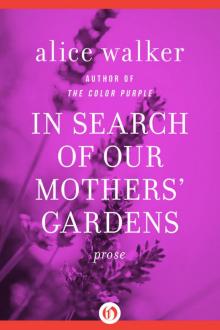 In Search of Our Mothers' Gardens: Prose
In Search of Our Mothers' Gardens: Prose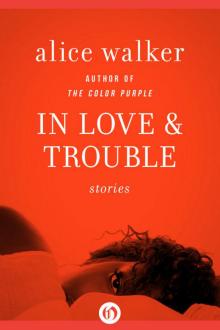 In Love and Trouble: Stories of Black Women: Stories of Black Women
In Love and Trouble: Stories of Black Women: Stories of Black Women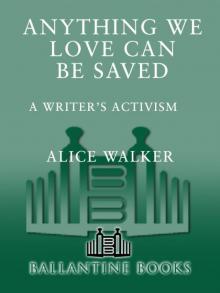 Anything We Love Can Be Saved
Anything We Love Can Be Saved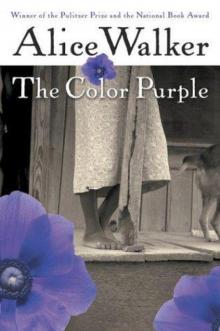 The Color Purple
The Color Purple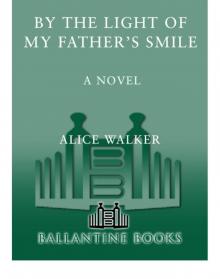 By the Light of My Father's Smile
By the Light of My Father's Smile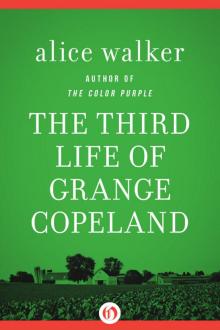 The Third Life of Grange Copeland
The Third Life of Grange Copeland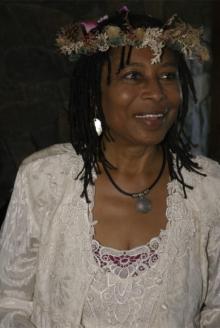 You Can't Keep a Good Woman Down
You Can't Keep a Good Woman Down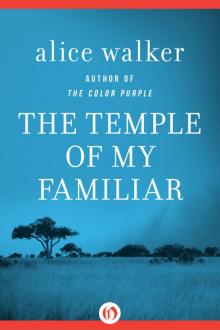 The Temple of My Familiar
The Temple of My Familiar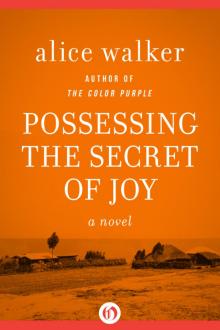 Possessing the Secret of Joy
Possessing the Secret of Joy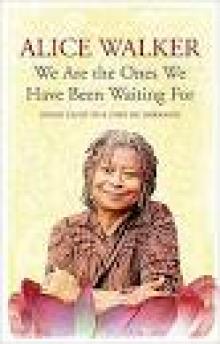 We Are the Ones We Have Been Waiting For
We Are the Ones We Have Been Waiting For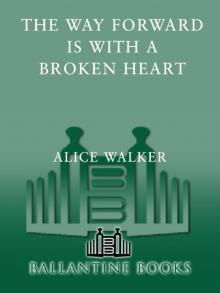 The Way Forward Is With a Broken Heart
The Way Forward Is With a Broken Heart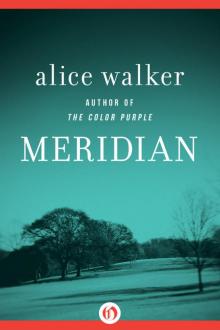 Meridian
Meridian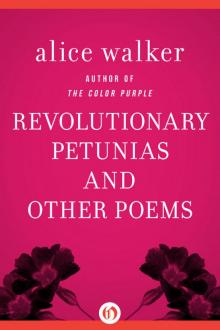 Revolutionary Petunias
Revolutionary Petunias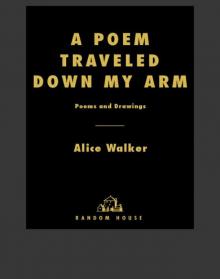 A Poem Traveled Down My Arm
A Poem Traveled Down My Arm Once
Once Horses Make a Landscape Look More Beautiful
Horses Make a Landscape Look More Beautiful Living by the Word
Living by the Word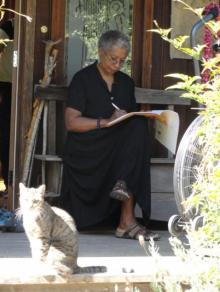 In Love and Trouble
In Love and Trouble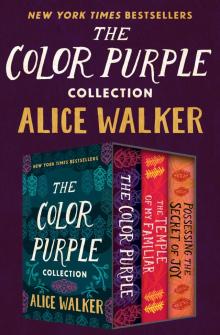 The Color Purple Collection
The Color Purple Collection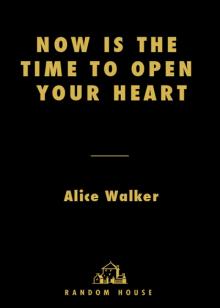 Now Is the Time to Open Your Heart
Now Is the Time to Open Your Heart Color Purple Collection
Color Purple Collection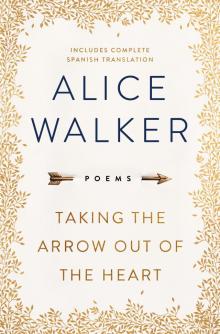 Taking the Arrow Out of the Heart
Taking the Arrow Out of the Heart The World Will Follow Joy
The World Will Follow Joy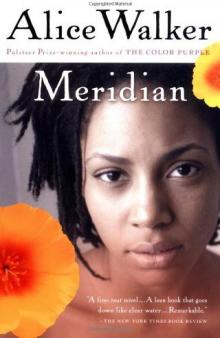 Meridian (1976)
Meridian (1976) Absolute Trust in the Goodness of the Earth
Absolute Trust in the Goodness of the Earth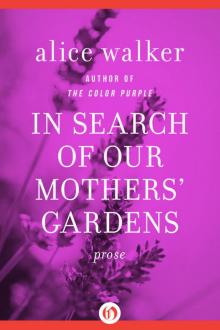 In Search of Our Mothers' Gardens
In Search of Our Mothers' Gardens